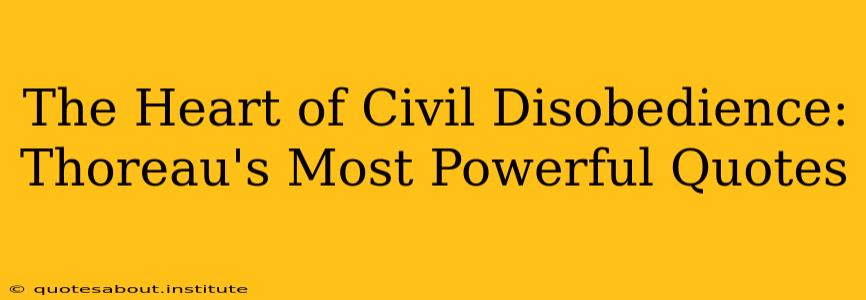Henry David Thoreau's essay, "Civil Disobedience," remains a cornerstone of philosophical and political thought, inspiring countless activists and thinkers across the globe. Its enduring power lies in Thoreau's articulation of individual conscience against unjust laws, a concept that continues to resonate with modern struggles for social justice. This essay delves into some of Thoreau's most impactful quotes, examining their context and exploring their enduring relevance. We'll also address some frequently asked questions surrounding his philosophy and its application.
What is the main idea of Thoreau's "Civil Disobedience"?
Thoreau's central argument in "Civil Disobedience" centers on the individual's moral obligation to disobey unjust laws. He asserts that a government that sanctions injustice loses its legitimacy, and citizens have a duty to resist such a government through acts of conscientious objection. This isn't about anarchy or lawlessness; rather, it's a principled stance against moral compromise. He famously advocates for a government that governs least, allowing individuals maximum freedom and self-governance.
What are some of Thoreau's most important quotes from "Civil Disobedience"?
Several quotes from "Civil Disobedience" have become iconic, encapsulating the core tenets of his philosophy:
"That government is best which governs least." This concise statement highlights Thoreau's belief in limited government intervention. He champions individual liberty and self-reliance, arguing that excessive government control stifles personal growth and moral development. The ideal government, according to Thoreau, facilitates individual freedom rather than dictating it.
"If a man does not keep pace with his companions, perhaps it is because he hears a different drummer. Let him step to the music which he hears, however measured or far away." This quote speaks to the importance of individual conscience. Thoreau emphasizes the necessity of following one's own moral compass, even if it diverges from societal norms. It encourages independent thinking and the courage to defy conformity.
"Must the citizen ever for a moment, or in the least degree, resign his conscience to the legislator?" This powerful question underscores the central conflict between individual morality and state authority. Thoreau argues that a citizen should never relinquish their moral judgment to the government; their conscience remains the ultimate authority.
"Under a government which imprisons any unjustly, the true place for a just man is also a prison." This illustrates Thoreau's willingness to accept the consequences of his actions. He believed that adhering to one's conscience, even if it leads to imprisonment, is a morally superior path than passively complying with injustice.
How does Thoreau define unjust laws?
Thoreau doesn't provide a rigid definition of unjust laws but rather suggests criteria for assessment. A law is unjust, according to Thoreau, if it violates fundamental principles of morality or justice. He emphasizes that a law's legality does not automatically equate to its moral rightness. He encourages critical examination of laws based on their impact on individuals and society.
What is the significance of Thoreau's actions in relation to his writings?
Thoreau's refusal to pay taxes in protest against slavery and the Mexican-American War powerfully exemplified his philosophy. His actions demonstrated his commitment to his ideals, lending credibility to his writings. His imprisonment underscored the risks and challenges of civil disobedience, adding weight to his call for moral courage.
What is the lasting impact of "Civil Disobedience"?
Thoreau's essay has had a profound and lasting impact, influencing major figures in the struggle for social justice, including Mahatma Gandhi and Martin Luther King Jr. His ideas have inspired movements for civil rights, women's suffrage, and environmental protection, proving that the core principles of individual conscience and resistance against oppression remain profoundly relevant in the 21st century. His legacy serves as a powerful reminder of the moral responsibility of citizens in the face of injustice.
This examination of Thoreau's powerful quotes from "Civil Disobedience," coupled with an exploration of frequently asked questions regarding his philosophy, provides a comprehensive understanding of this pivotal work and its continuing influence. The essay's enduring relevance underscores the ongoing importance of individual conscience in the pursuit of a just and equitable society.

